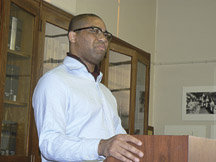More than 40 years has passed since the controversial killing of the Jersey City light heavyweight boxer Frankie DePaula.
DePaula was shot in the dark alley of an apartment building on Harrison Avenue on the city’s west side on May 14, 1970, allegedly lured there by a note from his manager. DePaula died four months later, as a result of his wounds, suffered in what is still believed to be a mob-sanctioned hit.
Though he passed away at the young age of 31, DePaula led a colorful life as a fighter. His brawlers mentality and larger-than-life personality – in and out of the ring – made him a legend, not just in boxing circles, but throughout his hometown and beyond.
DePaula’s life is captured in the new book, “JERSEY BOY: The Life and Mob Slaying of Frankie DePaula” by British lawyer and boxing enthusiast Adeyinka Makinde. Makinde spoke about DePaula on Sept. 1 in the New Jersey Room of the Jersey City Public Library’s Main Branch on Jersey Avenue to an audience of about 30 people. He also conducted a lively question-and-answer session with the attendees.
“One has to be cautious; it’s no big joke.” – Adeyinka Makinde
________
Makinde plans to make another appearance in Jersey City to promote the book on Sept. 18 at the library’s annual Tale of Our City book festival at Van Vorst Park on Montgomery Street in downtown Jersey City.
Jersey City boy still remembered
Frankie DePaula lived a life befitting someone born on the Fourth of July.
Fireworks usually followed DePaula, as the book chronicles childhood scrapes with the law to his slugging it out with prison inmates while doing a stretch in the 1960s.
And he was always the center of attention, whether winning the light heavyweight champion title at the 1962 New York Golden Gloves Tournament, or being captured on audio tape by federal agents admitting to his part in a copper heist, and later, throwing one of his fights.
Makinde, who previously authored a book on Nigerian middleweight Dick Tiger – who battled DePaula in a memorable 1968 fight at Madison Square Garden – addressed many sides of DePaula, including the big-spender, the ladies’ man, and the protector of the little man.
Looking back at Frankie
During his appearance at the library, Makinde said that he started on his DePaula book after DePaula’s late son, Michael, contacted him about writing a book about his late father in the same vein as Makinde’s Dick Tiger book.
Makinde said he spent three years putting together the book, including time spent doing research in the library’s New Jersey Room.
One of the most difficult aspects of writing the book, Makinde admitted, was touching upon DePaula’s relationship with alleged mob figures such as James “Jimmy Nap” Napoli and
Hoboken native Bobby Manna, who had a hand in DePaula’s boxing career. Both are alleged to have played a part in his death after DePaula had an affair with a Mafia boss’s stepdaughter.
“One has to be cautious; it’s no big joke,” Makinde said. “People would have seen people disappear literally… people would have seen people maimed and killed for talking out of turn.”
Makinde, when asked by a reporter if he was able to interview anyone connected with the Mafia for his book, said he was only able to speak to a person involved in the copper heist with DePaula.
During the question-and-answer period, a member of the audience called a section of the book, where Makinde writes about DePaula being captured on FBI tape telling James Napoli about the heist, “far-fetched.”
The room grew quiet when DePaula’s youngest son, Joseph, asked Makinde about his book’s assertion that DePaula’s brother Joey put a pillow up to his face to suffocate him while he was in the hospital. Makinde answered that it was based on “confidential information.”
DePaula, who was two years old when his father died, then asked Makinde, “If my father was here today, what do you think that he would think about the book?”
Makinde joked about wanting to “protect his facial features” before saying that he thought the late Frankie DePaula would have “appreciated” the book.
For more about the book, visit http://www.facebook.com/pages/Frankie-DePaula/46574138192
Ricardo Kaulessar can be reached at rkaulessar@hudsonreporter.com.
